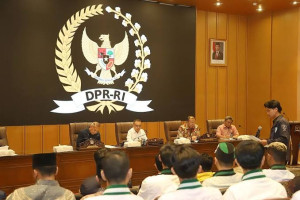Reserve Component to respond to threats of terrorism, territorial dispute
The Indonesian Military (TNI) has begun a campaign to increase the number of reservists in the force. The TNI recognizes the importance of a strong and well-trained reserve force in ensuring national security and defense, especially in light of current threats to the country such as terrorism and territorial disputes.
President Joko “Jokowi” Widodo signed Government Regulation (PP) No. 3/2021 on the Implementation of Law No. 23/2019 on National Resource Management for State Defense (PSDN Law) on January 12, 2021.
The recruitment of the National Reserve Component (Komcad) aims to attract a diverse group of individuals to join the reserves and receive training to improve readiness and capabilities. The TNI is investing in new equipment and technology to enhance the effectiveness of the reserve force, while also addressing challenges such as limited resources and budget constraints.
Reserve component breakdown
In 2022, a total of 2,974 people were recruited and assigned as reserve military personnel in the TNI. The breakdown of these individuals is as follows:
- 450 were assigned to the ground forces, which is responsible for land-based operations and defense of the country.
- 1,450 were assigned to the army, which is the main branch of the ground forces and responsible for ground combat operations.
- 499 were assigned to the navy, which is responsible for maritime defense and protection of the country's territorial waters.
- 500 were assigned to the air force, which is responsible for air defense and air-based operations.
- 50 women were sent to the Army Women's Corps Education Center of the ground forces, which is a unit specifically for women in the military.
- The rest of the individuals were assigned to the Defense University of the Republic of Indonesia, which is a higher education institution for military training and education.
The data suggests that the TNI has been actively recruiting and assigning reservists to various units within the military in order to strengthen its defense capabilities. The assignment of reservists to the ground forces, army, navy and air force shows the military's effort in balancing the number of reservists across different branches, so that the country's defense capabilities are more comprehensive.
Why Indonesia bolsters up its military manpower capabilities?
The Ministry of Defense website cited the need to compete with large countries that already had a well-established reserve system, such as the United States, China, Russia and India, as one of the reasons for the recruitment drive for reservists in the country. This suggests that the military recognizes the importance of having a strong and well-trained reserve force in order to ensure national security and defense, especially in light of the ongoing global competition among major powers.
Another possible reason for the recruitment drive is the looming territorial threat in the South China Sea with China. There have been increasing tensions and territorial disputes in the South China Sea recently. It is likely that Indonesia and the TNI see the need to bolster its military capabilities to better defend its territorial interests in the region. The recruitment of reservists is seen as an important step in strengthening the country's defense capabilities and ensuring the safety and security of all Indonesians.
Already have an account? Sign In
-
Start reading
Freemium
-
Monthly Subscription
20% OFF$29.75
$37.19/MonthCancel anytime
This offer is open to all new subscribers!
Subscribe now -
Yearly Subscription
33% OFF$228.13
$340.5/YearCancel anytime
This offer is open to all new subscribers!
Subscribe now







